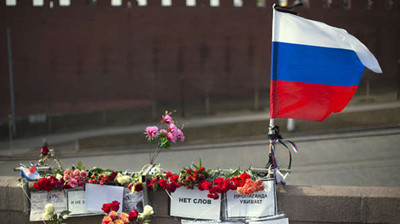Russia's politics of memory
俄羅斯的政界往事
NemtsovBridge
涅姆佐夫橋
A fight over the site of a politician's killing is a proxy for a broader battle
關(guān)于政治家遇刺之地的爭(zhēng)論標(biāo)志著論戰(zhàn)范圍擴(kuò)大化
Remembered with love
以愛緬懷
MEMORY has long been the subject of fierce and often deadly ideological battles inRussia. Those who control the past also control the present. Following the murder of Boris Nemtsov, a liberal opposition leader, on a bridge by the Kremlin, a fight for his memory, and for the Russian flag, is taking place. In Soviet times, purged Communist Party members were excised from photographs as though they never existed. Now it seems the Kremlin is trying similarly to airbrush Mr Nemtsov.
追憶哀思已成為俄羅斯激烈之思想論戰(zhàn)的永恒主題。曾經(jīng)的執(zhí)政者今日仍舊謀權(quán)在位。繼自由黨反對(duì)派領(lǐng)導(dǎo)人鮑里斯·涅姆佐夫于克里姆林宮大橋遇刺之后,俄羅斯正展開一場(chǎng)關(guān)于追憶涅姆佐夫以及俄羅斯國(guó)旗的論戰(zhàn)。蘇維埃時(shí)期,照片中要?jiǎng)h掉被清洗出局的共產(chǎn)黨員,仿佛他們未曾出現(xiàn)過一樣。如今的克里姆林宮似乎正以同樣的方式妄圖抹去涅姆佐夫在大眾心中的印記。

First Kremlin spin-doctors tried to divert attention from Mr Nemtsov's murder to the “sudden” disappearance of Vladimir Putin, Russia's president. Ten days later, Mr Putin re-emerged triumphantly and celebrated the anniversary of Russia's annexation of Crimeaat the spot where Mr Nemtsov died. A frenzied crowd yelled “Ross-i-ya”, as if that could quash memories of Mr Nemtsov and his opposition to war inUkraine.
起初,克里姆林宮的公關(guān)專家試圖將公眾視線從涅姆佐夫遇刺案,轉(zhuǎn)向俄羅斯總統(tǒng)弗拉基米爾·普京“突然”失蹤案上來。十天之后,普金總統(tǒng)又得意洋洋地再次出現(xiàn)在公眾面前,并在涅姆佐夫遇害之地慶祝俄羅斯吞并克里米亞半島之事。瘋狂的人群高喊著“俄-羅-斯”,仿佛這樣便能夠淡去對(duì)涅姆佐夫的追憶哀思,淡化他對(duì)烏克蘭之戰(zhàn)的反對(duì)。
In the middle of the night on March 27th, a month after Mr Nemtsov's murder, the authorities cleared the bridge of flowers and photographs. Thanks to Mr Nemtsov's friends and followers, the memorial was restored. People across the country ordered flowers online, and supporters took them to the bridge. Mr Nemtsov's photographs under Russian tricolours have been remounted on the balustrade. Volunteers guard the memorial day and night in snow and rain, sustained with tea and food by ordinary folk. They will not go away; they are being true to Mr Nemtsov's spirit.
3月27日的午夜,也就是涅姆佐夫遇害的一個(gè)月后,俄羅斯當(dāng)局清掃掉了大橋上的鮮花以及照片。多虧了涅姆佐夫的摯友以及追隨者,這些紀(jì)念物品才得以保留恢復(fù)。俄羅斯全國(guó)人民從網(wǎng)上訂購(gòu)鮮花,由涅姆佐夫的擁護(hù)者帶到大橋上。涅姆佐夫在俄羅斯三色旗下的照片已被重新裝裱掛在了矮護(hù)墻上。志愿者不論風(fēng)雪、夜以繼日地堅(jiān)守看護(hù)著紀(jì)念品,普通民眾會(huì)送些茶水和食物以供他們充饑。他們不會(huì)離去;他們始終忠于涅姆佐夫靈魂。
He managed to stay in politics despite state propaganda labelling him a “foreign agent” and “fifth column”. But fighting Mr Nemtsov after his death may prove even harder than it was during his life. Groomed to beRussia's liberal president by Boris Yeltsin, the charismatic, honest Mr Nemtsov could turn into a symbol ofRussia's unfulfilled promise. The display ofRussia's national flag next to his name should be particularly troubling for the Kremlin.
盡管國(guó)家宣傳將涅姆佐夫扣上“外國(guó)特工”和“內(nèi)奸”的帽子,他在政治上仍保有一席之地。不過,涅姆佐夫遇刺后的論戰(zhàn)或許會(huì)比他生前的爭(zhēng)議愈加激烈。鮑里斯·葉利欽贊譽(yù)他是俄羅斯魅力超凡、真誠(chéng)坦率的自由派領(lǐng)袖,可謂是俄羅斯宏圖未展的象征。在涅姆佐夫名字旁邊懸掛俄羅斯國(guó)旗令克里姆林宮非常不悅。
The bridge has already been dubbedNemtsovBridge. It could now become a focal point of liberal opposition to a brutal regime, a role that after 1991 was played by the White House, then the seat of the Russian parliament. The Kremlin will try to clear the bridge of traces of Mr Nemtsov's murder. But the harder it tries, the more resonant the spot will become.
這座大橋已被冠以涅姆佐夫大橋的名字。如今它成為自由黨反對(duì)殘酷證券的聚焦點(diǎn)。俄羅斯議會(huì)統(tǒng)治中心與白宮1991年后充當(dāng)?shù)慕巧嗤?死锬妨謱m企圖清除大橋上涅姆佐夫被害的證據(jù)。然而,他們愈是如此大力地抹去記憶,這座大橋的名號(hào)愈是回聲嘹亮。譯者:陳思思 校對(duì):石海霞












